Co-operatives and Mutuals in the Age of Uncertainty
March 11, 2020
At the end of last year, we conducted a national survey of 5,000 Canadian adults for Co-operatives and Mutuals Canada that explored public attitudes about the economic system, broader public concerns, and what role co-operatives could play in alleviating those concerns. The survey also sought to profile cooperative members in Canada.
The survey finds that there is a wide audience for the cooperative business model and a big opportunity for the Co-operative and Mutual Sector to expand and connect with Canadians who seek more control and influence over decision making and want organizations they interact with to invest back in the communities they live in.
The results will be of value to anyone working in the Co-operative and Mutual Sector, policymakers and elected officials, and interested citizens concerned about the direction of the economic system and the rise of polarization and populism in Canada and around the world.
POWER TO THE PEOPLE
The feeling of vulnerability, powerlessness, or not being sufficiently in control over one’s life forms the basis for much of the anxiety in society today.
More than half of Canadians (58%) don’t feel in control over their lives and younger Canadians are more likely to feel this way.

This feeling is strongly related to other attitudes. Those with a sense of powerlessness are more likely to feel the country is headed in the wrong direction, are less satisfied with their lives, and are more likely to feel that the economic system is rigged against them.
This sense can lead to resentment, anti-establishment, anti-system, and anti-immigration sentiment. It can divide people and increase support for populist and authoritarian leaders who offer control, order, and stability, but often propose policies that do little to change the economic or social outcomes for those feeling most anxious.
At the same time, Canadians are deeply concerned about housing affordability, climate change, income and wealth inequality, and the influence of powerful interests on government policy. There’s also growing concern about immigration policy, racism, and for those living in rural communities, the decline of small town in Canada.
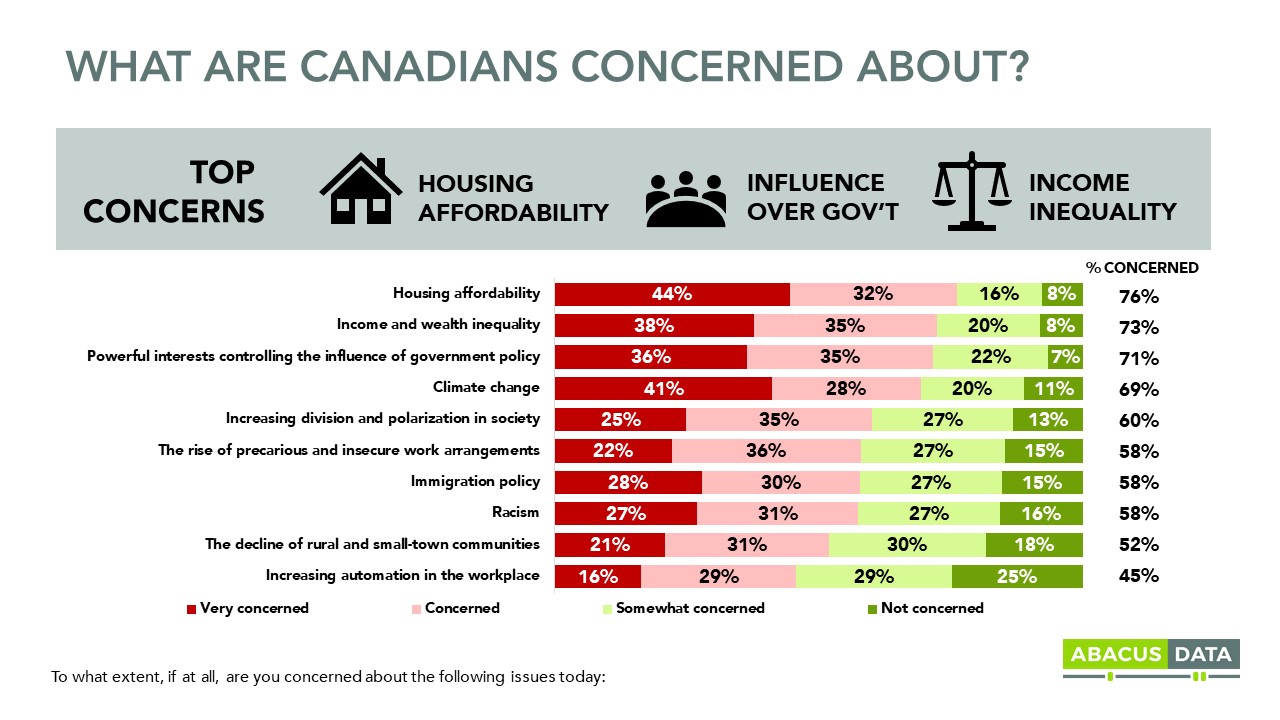
AN ECONOMIC SYSTEM THAT DOESN’T FEEL LIKE IT’S WORKING WELL
In an environment where people seek control – control over their workplace and career, their future, and the communities where they live – most look at the economic system and say it’s rigged against people like them (60% agree with this sentiment). At the same time, few say that other people can be trusted and that when businesses make a lot of money, everyone benefits.
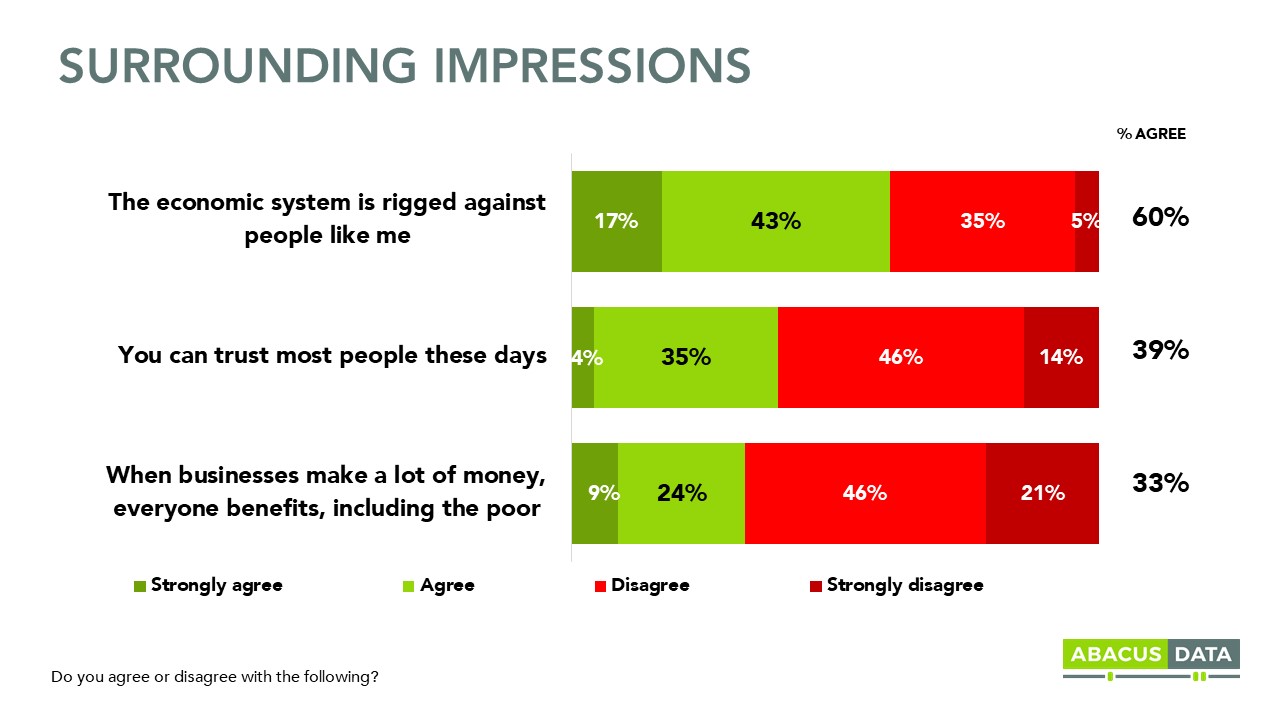
What drives these feelings?
Motivations are varied, but large numbers of Canadians feel that those with power and money have too much political influence, that a small number of people benefit from the wealth generated by the economy today, and even though companies make good profits, they share them only with a few shareholders unlike co-operatives who share them with all member-owners. There is a sense that the many are not benefiting from growth nor have a say in decisions their employers, governments, and affiliated organizations are making.
Despite the fact that unemployment is at historic lows in Canada, the overall poverty rate is down, and corporate profits have improved over the past few years, Statistics Canada finds median after-tax income for households and individuals has not changed over the same period.
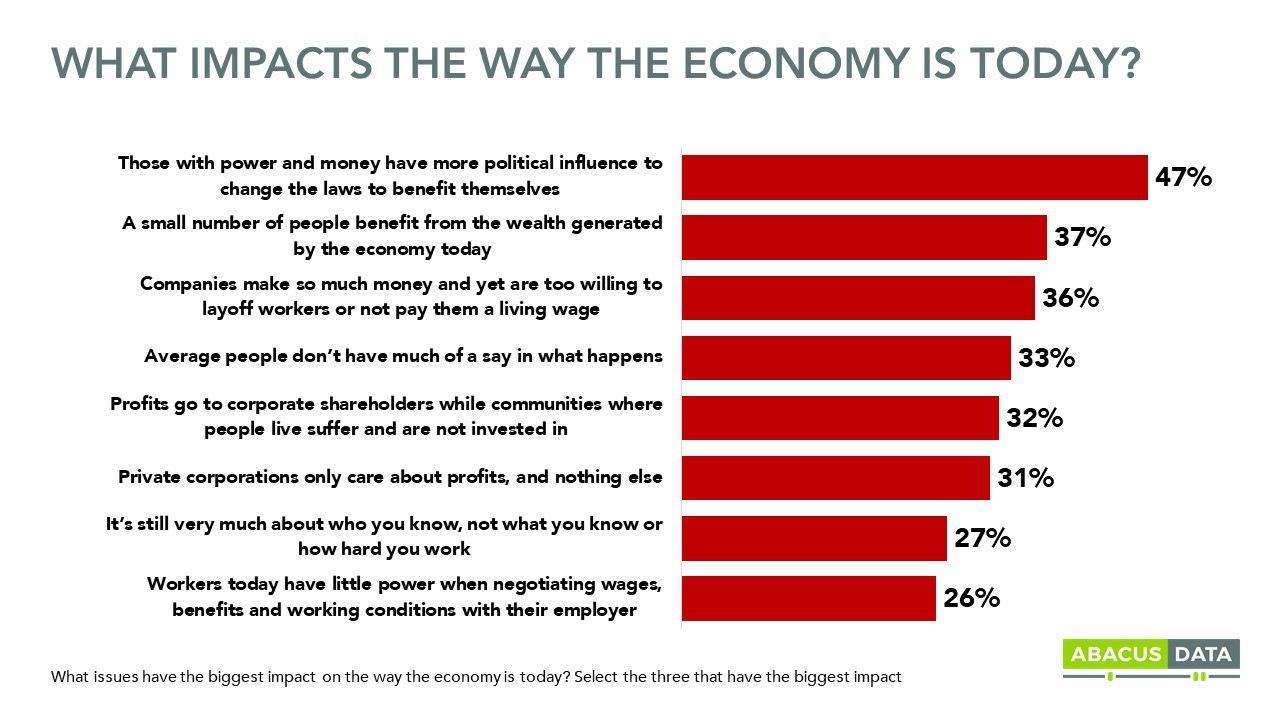
When we ask people to rate the performance of corporations in Canada on a range of metrics, the four that receive the most negative assessment are whether they are:
1. Doing the right thing for their employees;
2. Sincerely limiting their impact on the environment;
3. Giving their customers a say in how the business is run; and,
4. Giving their employees a say in how the business is run.
While most think corporations do a good job looking out for their shareholders, they are perceived to be doing a poor job doing the right thing for employees or giving their employees or customers a say in how they run the business.
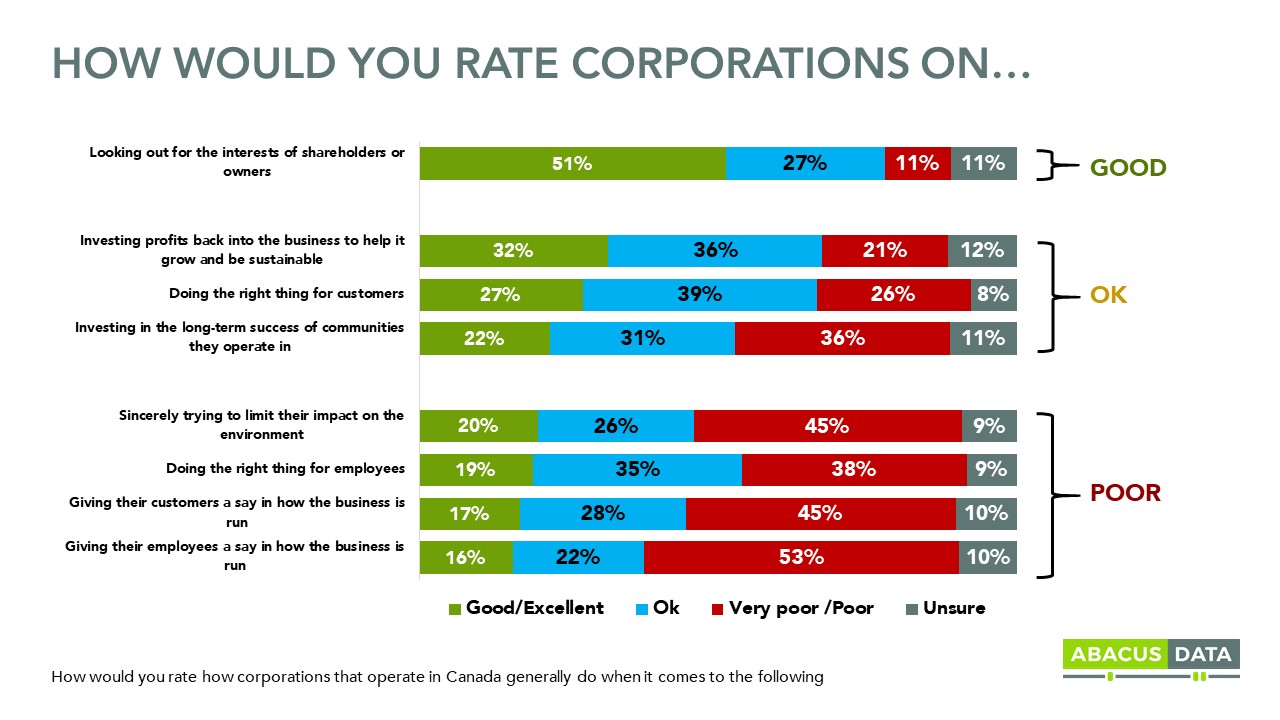
Despite this sense of powerlessness and uncertainty, almost all Canadians, regardless of political orientation, generation, or geographic location agree that the world would be a better place if more people collaborated with each other. Co-operation and collaboration are what people seek.

ARE COOPERATIVES A SOLUTION TO UNCERTAINTY?
As people seek more control over their lives, their jobs, and their communities, co-operatives appear as a legitimate alternative to an economic system and business model that so many people find inadequate and for some, destructive.
In the survey, we showed respondents six pillars of the co-operative model to gauge reaction to them. Overall, all six appeal to people but principles focused on inclusiveness, community impact, financial ownership, and membership control are particularly appealing.
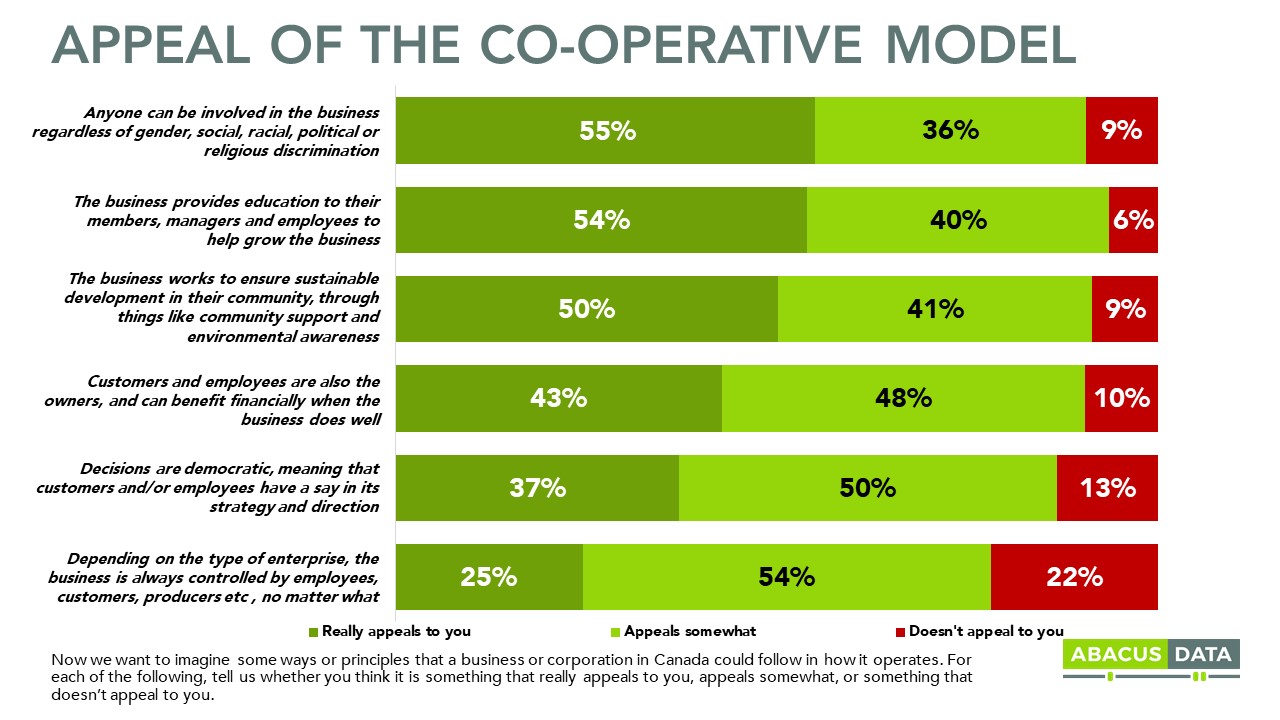
Our research also finds that a clear majority of Canadians (57%) have a deep connection to the same values of the co-operative and mutual sector. Among this group, almost all like to support local whenever they can, they want a say in how the place they work runs, agree that those who support or work in a business should benefit from its success, and agree that when people cooperate to address what they need, it produces better outcomes.
We call these Canadians co-operators. They are the primary target for co-operatives to grow and expand.
Overall, 1 in 3 Canadian adults are currently a member of a co-operative, and, of those who are not currently a member, 61% of them say they are interested in joining a co-operative.
Among those who share co-operative values, the opportunity for co-operative growth is even more clear and substantial:
37% of Canadian adults or approximately 10.7 million people are not co-operative members but should be, based on their values and intent to join a co-operative. This is the co-operative opportunity.
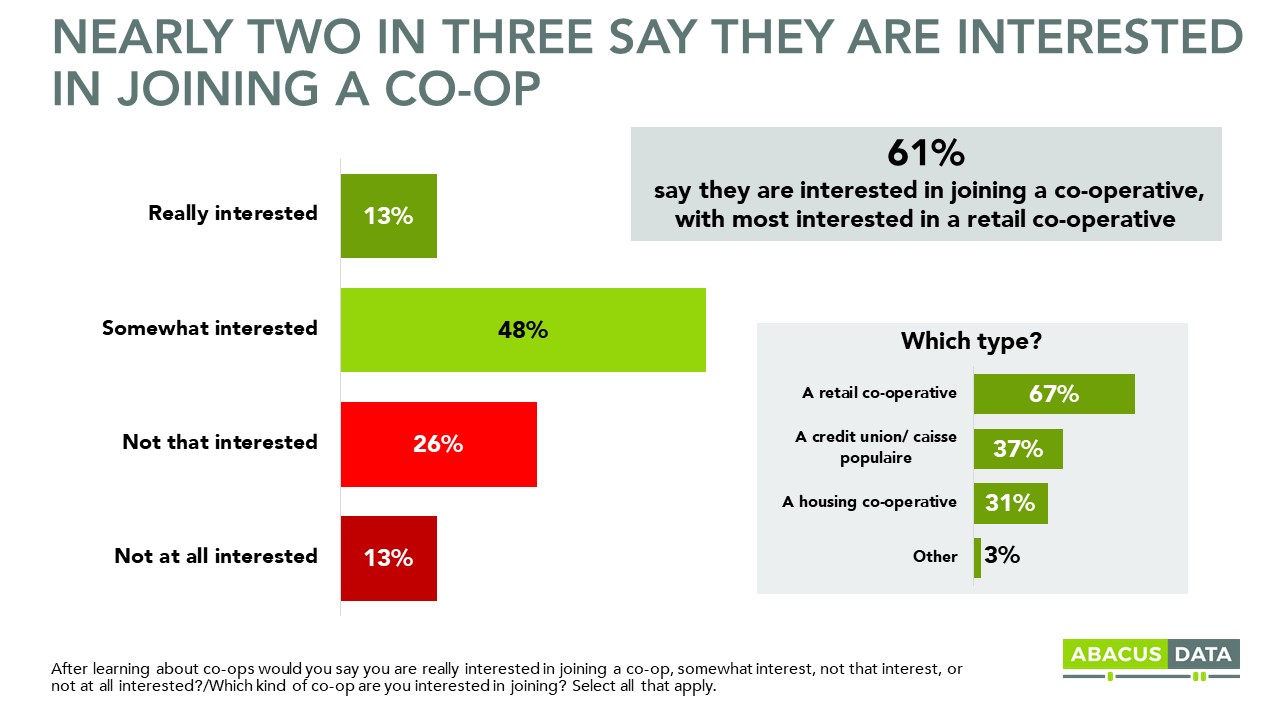
More significantly, nearly half of Canadians say the country would be better off if more co-operatives were in operation while only 5% felt things would be worse off.
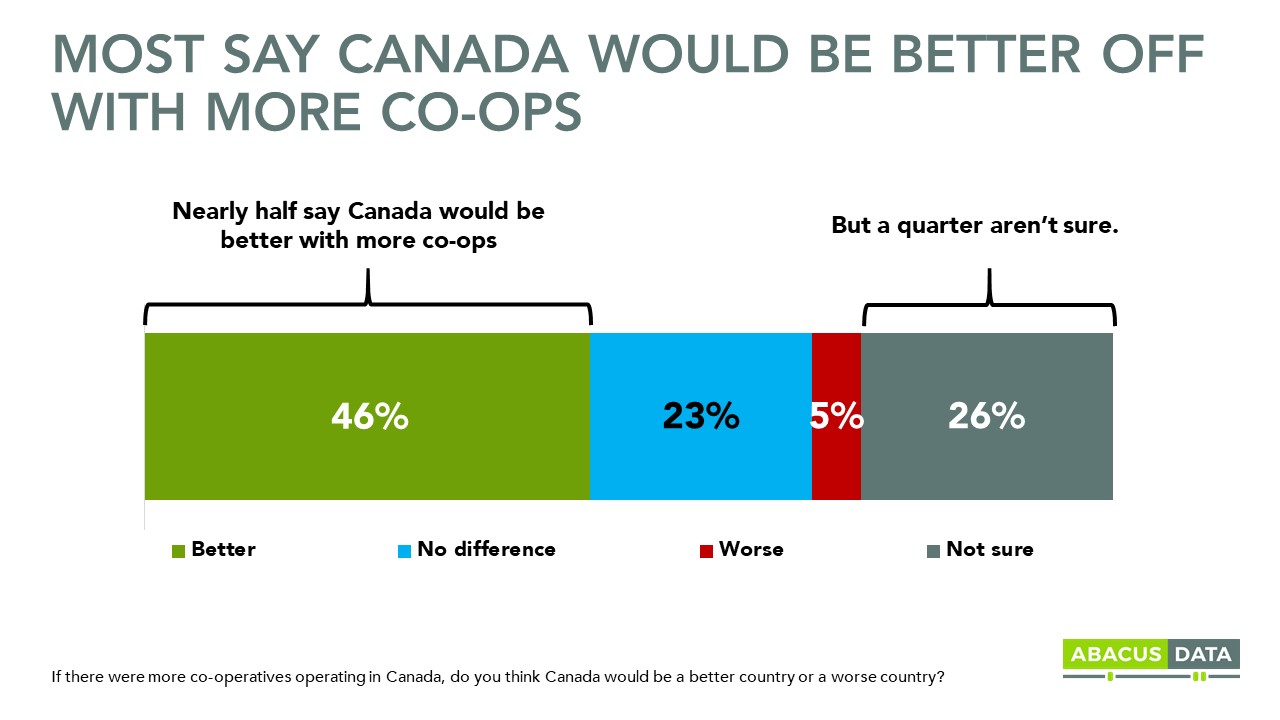
CO-OPERATIVES ARE A SOLUTION TO POLITICAL DIVISION
At the same time that co-operatives can empower people and communities, they may also heal political division by uniting Canadians from different political orientations.
In our study, we identified four unique ideological groups in Canada based on responses to a set of questions. Members of these groups share a common worldview which informs their views about politics, society, and public policy.
The largest group at 33% of the population is what we term the populists. They are by far the most skeptical of elite decision-making, they are pessimistic about the future, and most resistant to change. They believe the economic system is highly rigged against them and they see immigration as a threat.
The second largest group (28% of the population) is the Progressives. They are the most open-minded and forward-looking but worry about the future. They believe climate change is a crisis, that inequality is pervasive in society and the economy, and that government is a force for good. They also deeply value collaboration and co-operation.
Similar in size to the Progressives, Classic Liberals (27%) see the good that government can do and are generally progressive on social issues but different in their view on inequality and their outlook on the future. They see change as a positive, something to be embraced and feel the future is bright. They are also more open to private-sector solutions.
Finally, at 12%, Classic Conservatives, are market-driven and see less of a role for the state in many aspects of life. They are therefore suspicious of government and worry about the coercive power of the state. They are skeptical about change, worried about the future, but less concerned about economic inequality. Most don’t consider climate change to be a serious threat.
Here is what our research tell us about how co-operatives can engage and unite them:
1. Populists and progressives are the most likely to feel a sense of powerlessness. They also overwhelmingly agree that the economic system is rigged against them. The co-operative business model has a solution to those who seek more control and influence in decisions both micro and macro.
2. Populists and classic conservatives are more concerned about the decline of small-town communities. Co-operatives have a long history of serving smaller communities, while many other types of businesses don’t. Co-operatives bring jobs, financial resources, and energy to small and rural communities.
3. Progressives, classic liberals and populists are concerned about climate change and feel that corporations today are not sincere in their efforts to tackle the climate emergency. Co-operatives are committed to sustainable business practices and making decisions that are in the best interest of the communities they serve.
4. Progressives and populists are deeply concerned about the rise of precarious and insecure work and economic inequality. They feel the rich and powerful have too much influence over political decisions. The co-operative business model has a solution to those who seek better and inclusive working conditions, good wages, and economic justice.
The research clearly suggests co-operatives can unify disparate political groups – those who are normally on opposite sides of issues – by addressing the concerns that they have and offering the co-operative model as an alternative.
But to achieve this unity, more Canadians need to be aware and understand the co-operative business model and see it as a viable alternative to other models.
CO-OPERATIVES REMAIN LARGELY UNKNOWN TO MANY CANADIANS
The co-operative model is not well understood by most Canadians. Only 10% say they are very familiar with the co-operative business model with another 37% saying they are pretty familiar. Our exploratory focus groups conducted before the survey identified this as well.
The lack of familiarity expresses itself in a general lack of understanding of some core facts about co-operatives and how they compare to other types of businesses. While most know that when a co-op makes a profit, the money is shared with members or invested back into growing the business, many don’t know that the co-operative model encourages a business to think about the long-term. Many think co-operatives are just small businesses, or that co-operatives are less efficient than other businesses.
Most striking, 3 in 4 Canadians are unaware that the largest financial institution in Quebec, The Desjardins Group, is a co-operative, including half of Quebec residents.
But despite the weak understanding of co-operatives, a plurality of Canadians thinks that if more co-operatives were operating in Canada, the country would be a better place. Only 5% think it would be worse off.
3 IN 10 CANADIANS ARE ALREADY BENEFITING FROM THE CO-OPERATIVE MODEL.
Approximately 9 million adult Canadians (or 30% of the adult population) report being a member of a co-operative. Another 15% may be a member but are unsure (representing another 4.4 million people).
17% of Canadians report being members of a credit union or caisse populaire, including 35% in Quebec.
14% report being members of a retail co-operative like MEC, a grocery store, or gas station.
3% report living in a housing co-operative.
1% report being a member of another type of co-operative.
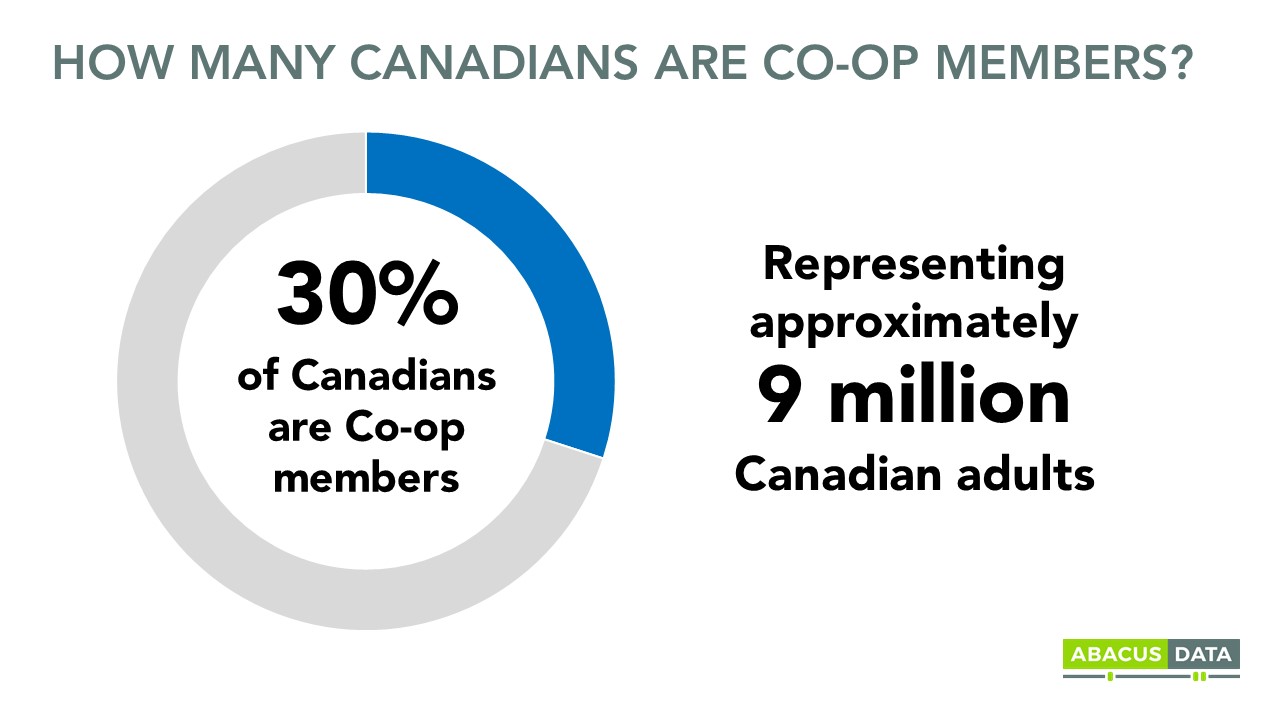
To these members, co-operatives every day provide products and services they rely on, provide meaningful employment, and/or serve their communities when other businesses sometimes won’t.
Co-operative members are:
More concentrated in Quebec and the Prairies.
Slightly more likely to live in a rural community than other Canadians.
Multi-generational.
Equally men and women.
Cross-partisan – members are Liberals, Conservatives, New Democrats, Bloquistes, and Greens.
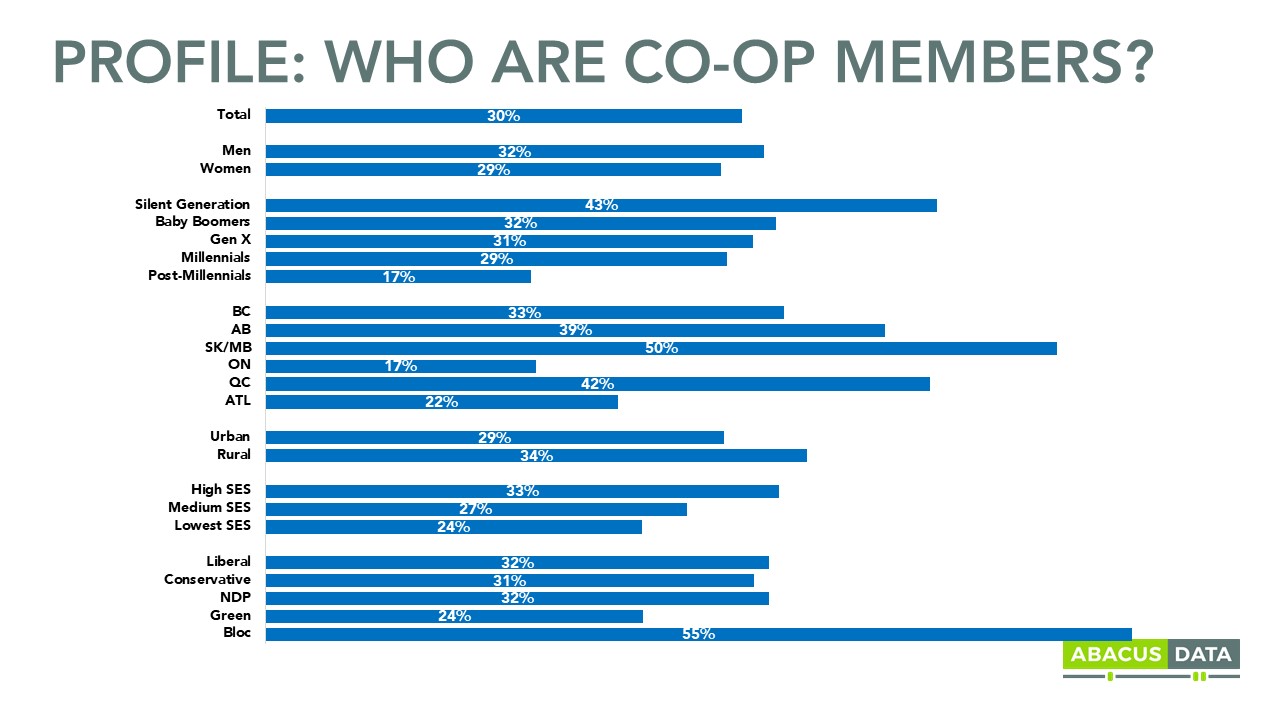
In many ways, co-operative members are a cross-section of Canada and look, think, and behave very much like other Canadians who are not co-operative members.
But within the co-operative membership, our survey identified a subgroup of members (70%) who say they joined because they share the same values as co-operatives.
These members express views that are more consistent and co-operative in nature. They are far more likely to intensely agree that they care how: companies they support operate; that when people co-operate to address what they need, it produces better outcomes; and most importantly, that companies should care about the community they operate in.
Co-operative members are also more likely to say most people can be trusted and slightly less likely to feel the economic system is rigged against them.
CONVERTING THE CO-OPERATIVE POTENTIAL
As mentioned previously, approximately 8.7 million adult Canadians (or 30% of the adult population) report being a member of a co-operative. Another 10.7 million share co-operative values but are not members. That means there’s a potential audience of 19.4 million or 2 in 3 Canadian adults or who could participate in the Co-operative and Mutual Sector.
THE UPSHOT
There is an unease about the future in Canada. Many feel the economic and political system is not working for them. That unease is tied to concerns about inequality, the concentration of economic and political power in a few hands, and the impacts of climate change on their lives. To many, they seek control in their lives and feel isolated from the power structures – whether at their place of work or with the institutions (public or private) they interact with. In short, they feel helpless and isolated.
The alternative is a more democratic and empowered life. One in which more people have a say in how their workplace operates, in how the organizations they rely on and interact with on a daily-basis are run, and in how government decisions are made.
Co-operatives are well placed to offer Canadians of diverse backgrounds and political orientations a solution to this uncertainty by empowering members, employees, and suppliers to benefit from success and influence decisions.
Already one in three Canadians are co-operative members. They are young and older, male and female, Liberal, Conservative, New Democrat, Greens and the Bloc. Co-operative members reflect the diversity of Canada. They live in all parts of Canada, in our largest cities, and most remote communities.
But while many are already engaged in a co-operative, the opportunity for growth is even greater. Millions share the same values of the co-operative model. Millions are interested in learning more and joining a co-op. And half the country thinks Canada would be better off with more co-operatives.
In the age of uncertainty, co-operatives appear to be a solution; a solution to those seeking more control over their lives and a solution to division, polarization, and disagreement. Co-operation and collaboration, local community investment, and a democratic spirit of engagement are what they seek – are co-operatives the solution?
METHODOLOGY
Our survey was conducted online with 5,000 Canadians aged 18 and over from October 15 to 21, 2019. A random sample of panellists was invited to complete the survey from a set of partner panels based on the Lucid exchange platform. These partners are double opt-in survey panels, blended to manage out potential skews in the data from a single source.
The margin of error for a comparable probability-based random sample of the same size is +/- 1.4%, 19 times out of 20. The data were weighted according to census data to ensure that the sample matched Canada’s population according to age, gender, educational attainment, and region. Totals may not add up to 100 due to rounding.
The general population sample yields a sample of 1,463 co-operative members.
ABOUT ABACUS DATA
We are the only research and strategy firm that helps organizations respond to the disruptive risks and opportunities in a world where demographics and technology are changing more quickly than ever.
We are an innovative, fast-growing public opinion and marketing research consultancy. We use the latest technology, sound science, and deep experience to generate top-flight research-based advice to our clients. We offer global research capacity with a strong focus on customer service, attention to detail and exceptional value.
We were one of the most accurate pollsters conducting research during the 2019 Canadian Election.
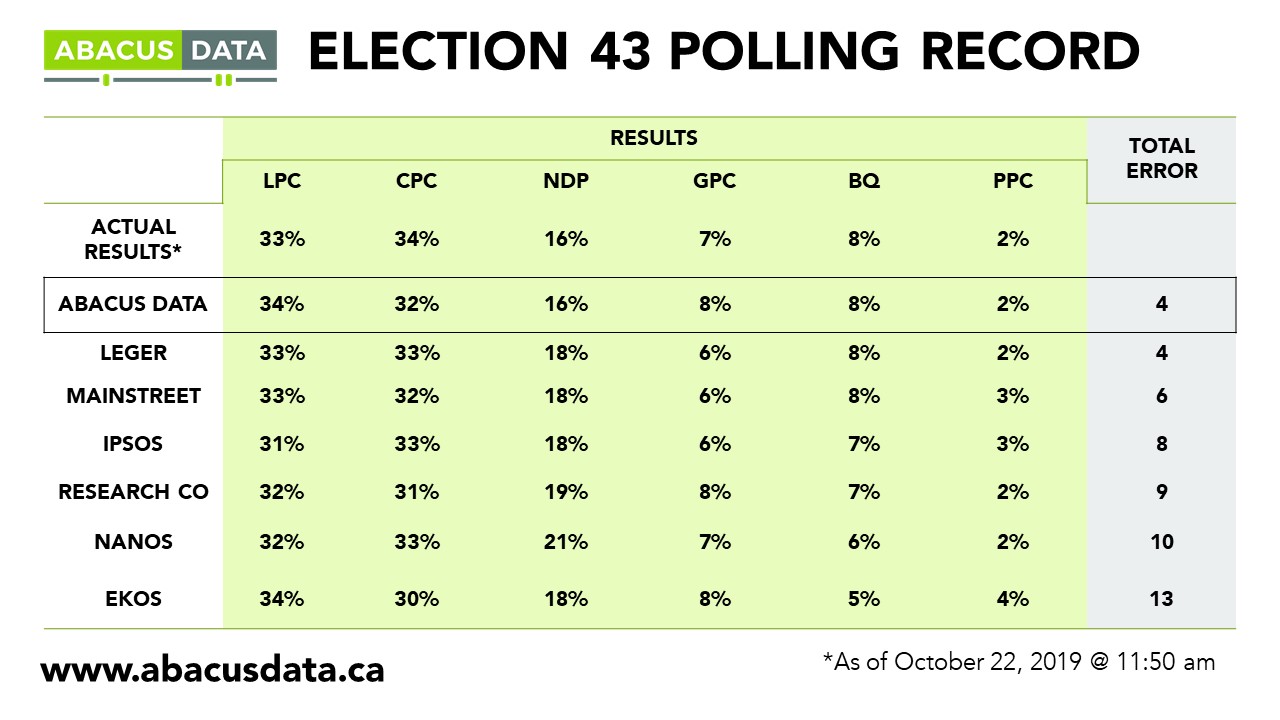
Contact us with any questions.
Find out more about how we can help your organization by downloading our corporate profile and service offering.



